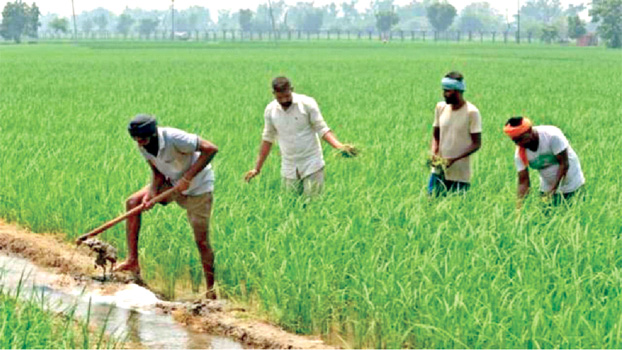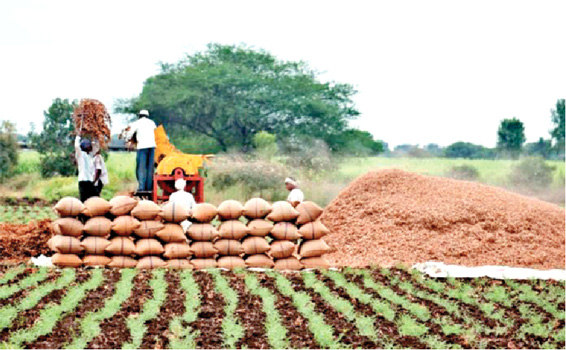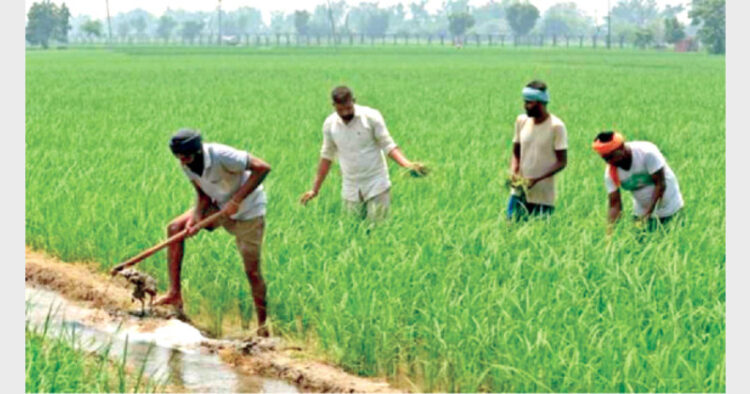It is certain that without increasing the productivity in all phases of farming operations, farming will never be profitable.The farmers should become quality conscious, as quality is the key to success. Our country can become a world leader in agri-products if necessary steps are taken
–Prof Richard Hay

Traditional and marginal farmers should be taught skilled farming
so that can earn higher income by working in their own farms
so that can earn higher income by working in their own farms
Self-reliance of the country in agriculture can leapfrog from strong support given to the farming community. It’s my firm belief that if our farmers can recover from the impact of the pandemic, our economy will recover faster than expected. Hence, I submit in all humility my proposals to empower our farmers by taking collective responsibility, mainly to double their income — a fervent dream of the Prime Minister — to keep the food value chain intact, and also ensure food security and employment, and thereby recalibrate the economy to help build a strong and stable New India.
Farmers can double their income if they receive remunerative prices for their hard-earned produce. The APMCs have failed in most cases in facilitating remunerative prices, and the resultant losses have made the farmers ever indebted to moneylenders. Farmers are at the mercy of traders who invariably exploit them. For the farmers: grading, transportation, packaging, and marketing are the biggest stumbling blocks. Hence, without reforming agricultural policy and providing relief measures, farmers would continue to recur losses. In this connection, I would like to suggest viable agricultural production and marketing reforms.
Another area of concern is that even though central institutions like ICAR and CSIR have contributed a lot in agriculture, these developments have not reached the farmers at large to motivate them to produce value-added products, a pragmatic method to double their income. Similarly, the Food Processing Ministry can extend its technical guidance to support the farmers to develop a variety of commercially viable products. The Ministry of Food Processing can compile the details of new products developed and disseminate this vital information among the farming entrepreneurs so that they can utilise it for setting up food processing industries in all the states. It is understood that the central institutions have extension service centers that can guide the farmer-entrepreneur to train and adopt new technologies and produce value-added products. It is the need of the hour to form an FPO system of organisations, which must have equal representation of youth and women so as to generate large-scale employment opportunities. Hence, these national institutions should have special wings that will look into the propagation of technology through publicity materials or dissemination through the media and organise compact exhibitions in rural areas. They can use the expertise of IIMs, IITs, and Agriculture Universities and simultaneously involve the Panchayat Raj institutions.
It is certain that without increasing the productivity in all phases of farming operations, farming will never be profitable. The initiatives like facilities for soil testing, use of organic farming and neem coated urea, use of bio-fertilisers and bio-pesticides are of great help to maintain quality products that would fetch a better price. Similarly, bringing down the pollution levels to increase productivity is an achievable target, which needs special emphasis. Crop diversification and increase in crop intensity with an integrated farming system are also achievable targets. Farmers’ income can be improved through technological innovations carried out by the national institutions. What I understand is that unless the cost of production is reduced, the farmers will not have any respite from recurrent losses.
Astringent law to regulate the use of pesticides can help curb the unsafe use of toxins in farming. Pesticide poisoning has been causing death to farmers and the local inhabitants in different parts of the country. In some states, excessive use of pesticides has resulted in water toxicity
Pesticide Management
Astringent law to regulate the use of pesticides can help curb the unsafe use of toxins in farming. Pesticide poisoning has been causing death to farmers and the local inhabitants in different parts of the country. In some states, excessive use of pesticides has resulted in water toxicity. The quality of pesticide used must be checked under the Insecticide Act. Preventing chronic toxicity and avoiding acute toxicity due to pesticide residues in food items should be the goal of Pesticides Management law. The government authorities must strictly guarantee FSSI regulations in maintaining the quality of agricultural products.
Water Scarcity: A Major Setback
Due to climate change, the farmers have been facing drought and water scarcity in different parts of the country, which has led to a fall in the income from farming by 25% in the unirrigated areas. To increase the income of the farmers, Science and Technology Department supported drip and sprinkler technologies, and water management strategies are the need of the hour.
Increase in Production of Oil Seed
Now let me deal with another important fact that needs immediate action from the policymakers in agriculture. There is a need to reduce agricultural imports in the country. As of now, the value of agricultural import is about 6% of the total import in the country. Considering a recent decline in the prices of crude oil, the value of agricultural import will shoot to around 10% of the country’s total import. Majority of these import is palm oil and dry fruits such as almond, pista, walnuts, etc. Barring edible oil, the rest of the agricultural import is not of any urgent need and can be reduced. The government of India can levy additional custom duty under WTO on the import of these agricultural products into the country. In tandem with the Ministry of Commerce, the Ministry of Agriculture can take appropriate action in this regard and save precious foreign exchange. Further massive drive for enhancing the acreage of oilseed production, including palm oil plantation, should be undertaken to enhance the production of oil in the country. It will help reduce dependence on other countries, save a precious dollar, and enhance the income of farmers in the country.
High Cost of Production: A Deterrent to Increase Income
The cost of production of most of the farming produce is high compared to other countries, and the result is — our farmers are at a loss, and they, in general, produce sub-standard products. The FSSAI stated that more than 65% of the locally produced milk sold in Indian markets is not fit for human consumption. It is distressing to note that our farmers are not abiding by quality standards. It is time to look at the quality control of all the products. For instance, fish and vegetables are sold using toxic chemicals that would endanger human lives. We can bring notable changes in this regard by following certain approaches that would revolutionalise the farming pattern. We have to save the farmers from their precarious living conditions. Mostly, farming in India follows the traditional farming method. But, modern farmers, including farmer-entrepreneurs, follow the latest farming technologies. Hence, the need for more and more FPOs. For the latter, they treat farming as a business venture. If given top priority by the Ministry of Agriculture, farming can make India a strong economy and solve the problems of unemployment. The farmers have to learn the latest farming techniques and set benchmarks of quality and practice, including cost reduction techniques. In this context, subsidies should be given to kick-start new ideas to reduce the cost of production, introducing benchmarks and production protocols.

Modi Government is committed to double farmers’ income by 2022
Training of Farmers
Farmer training programs need to be prioritised in the national budget. A trained workforce will increase labour productivity and thus assist the farmers in increasing their wages and overall income. National research institutes should come with technological breakthroughs for shifting production frontiers and raising the efficiency of inputs and precision farming to raise production. We should introduce a collective system of farming, thus making uniform farming practices and production benchmarks. To work in a particular agriculture industry, farmers should adhere to the regional collectives. These regional collectives should ensure quality benchmarks, collective resourcing, production protocols, and industry standards. Clusters or FPOs, or cooperatives can ensure regionally value-added products in the country. No doubt, this practice would bring a sea of change in the farming sector in its totality. It is pertinent to introduce apprenticeship programs, certificate courses, and diplomas for hands-on training of interested young farmers in the operation of farming equipment and learning of modern agriculture practices, farm management skills, financial as well as logistics skills.
Agronomy Services
Farmers in the country lack professional guidance from technical experts in the field of agriculture. Our academic community needs to study the market conditions across the world and update the farmers with inputs and market guidance. Farmers need to be fine-tuned to the latest production systems to achieve international standards in food production. New production protocols and benchmarks to ensure quality standards and cost-effectiveness should attract high-end Indian products fetching international customers. The employability of agricultural professionals also can be increased by these measures.
If given top priority by the Ministry of Agriculture, farming can make India a strong economy and solve the problems of unemployment. The farmers have to learn the latest farming techniques and set benchmarks of quality and practice, including cost reduction techniques
Stubble Burning and Pollution
Looking at the current state of air pollution, it is very important to wean farmers off stubble burning. The government of India can prepare a comprehensive national scheme to distribute crop residue management tools and machines with subsidies with the help of respective State governments. The residue after harvesting can be used for producing cattle fodder, biothermal energy, paper, and cardboard. There are available methods to pack stubble which helps to store more quantity of stubble in less space. It can be used for manufacturing packaging materials and being a good source of cattle feed.
The Professionalisation of Farming Activities
The workforce in all forms of farming has to be professionalised. Hence, appropriate skilling is highly essential, which requires an effective survey, analysis, planning, action, and evaluation. The Ministry of Skill Development needs to rise to the occasion and fulfil its obligations. The aspirational youth prefer to be part of modern-day farming ventures. It’s an ideal way to prop up employment opportunities in post-Covid times. It will also allow the youth to take up farming and will stop migration to the cities to look for an alternative source of employment.
Traditional and marginal farmers should be absorbed into the skilled workforce where they can earn higher income for working in their own farms and retainers for working in farm collectives, like FPOs. It is a proven fact that a group of farmers working as a collective can improve their productivity. I have observed that this technique can be quite successful. Such collectives are confident, resourceful, independent, and highly successful.
Role of eNam, FPOs and Rural Haats
Agriculture, for me, is an area of deep interest. As a former member of the standing committee on agriculture, I feel that strengthening the troika of eNAM, FPOs and Rural and Urban haats is critical to bypass the APMC lethargy and corruption help increase farmers income. Technology and professional management will play an important role in this regard. FPOs must use technology to connect with large buyers. Startups or social entrepreneurs must be encouraged to help provide necessary tech platforms for these ventures. Also, the FPOs need to be professionally run by trained managers with the right qualification, education, and experience. Lots of new consumer products on a commercial basis that would fetch markets all over the world can originate from agri-products made in India, which will be in tune with the “Make in India” initiative by the Hon. Prime Minister. We can also promote agritourism and earn foreign exchange. The farmers should become quality conscious, as quality is the key to success. Our country can become a world leader in agri-products exports under the vibrant leadership of our Hon. Prime Minister. All these affirmative actions would necessarily help double farmers’ income by 2022.
(The writer is a former Lok Sabha MP. The article is excerpted from his book, Reinventing India)














Comments